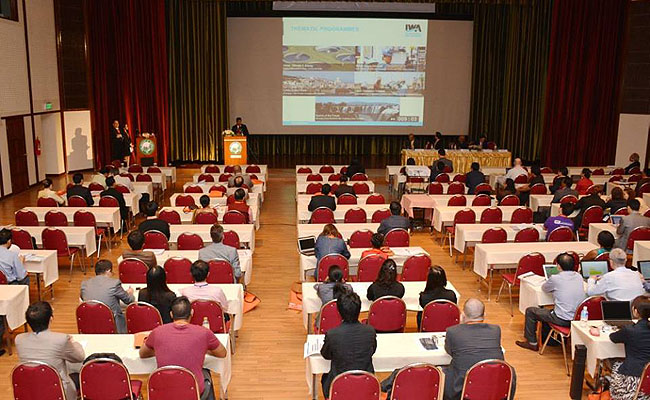Co-organized by Japan Sanitation
Consortium, Wastewater Management Authority (Thailand), Faculty of
Engineering of the Prince of Songkla University, Environmental
Engineering Association of Thailand and AIT, the 3-day conference
attracted 149 scientists, practitioners, researchers, young
professionals and students from 32 countries.
The event was an international platform for exchanging relevant
knowledge, research and practical experiences in water management and
sanitation technologies, with an emphasis on integrated approaches and
sustainable solutions for the region’s poor.
The waste water challenge facing developing countries is enormous,
said conference organizer and co-chair Dr. Thammarat Koottatep. Despite
large-scale efforts to improve people’s access to sustainable waste
water management and proper sanitation, “in developing countries the
situation is still grim and has hardly improved,” the AIT scientist
said.
There is a growing belief that technology must be relevant and
appropriate to local circumstances. "Just copying and pasting
technology from developed countries will not always work in developing
countries," Dr. Thammarat stessed.
“Over 1 million people die each year due to water-borne diseases,”
said Thammasat University’s Prof. Chongrak Polprasert in his welcome
address. The international program committee member and former dean of
AIT’s School of Environment, Resources and Development cited dire World
Health Organization statistics as he called on the young researchers
gathered to find workable solutions. “You are our hope for the future
of clean water and sustainable development.”
Mr. Ganesh Pangare, Region Director for Asia-Pacific, IWA, now based
in Bangkok, emphasized the severe implications of adding 800,000
residents to urban areas around the world each week, saying this
exponential increase will continue unabated for the next forty years.
Moreover, 80 per cent of humanity or 5.8 billion people currently have
no access to water treatment or sewage treatment, he said.
Stressing the magnitude of the issue in the Asia-Pacific region,
Chairman of the AIT Board of Trustees H.E. Dr. Subin Pinkayan
congratulated the conference organizers and AIT management for tackling
the problems through international scholarship and networking.
Addressing the conference opening, AIT President Prof. Worsak Kanok
Nukulchai said that even though water has been a focal point of
scientific inquiry at AIT for over a half a century, never before has
it been a concern like it is today, as water issues have assumed global
prominence.
Thanking the organizers and sponsors, President Worsak stressed that
the international conference would broaden participants’ perspectives
of the challenges and potential solutions. “I look forward to AIT
continuing as a leader in this field and facilitating ever more
partnerships with universities, government agencies, industry and
international organizations,” he said, welcoming the delegates.
In his keynote address titled ‘Science and Technology for Sustainable
Water Management,’ guest of honor Professor Emeritus Shinichiro Ohgaki
of The University of Tokyo, spoke the major ‘structural’ and
‘unthinkable’ changes over the past 25 years, such as the urban
population explosion and global climate change, which have compounded
the issue of providing safe water and sanitation to the world’s poorest
regions.
Offering numerous examples of ongoing research and outreach projects
in Japan, Prof. Ohgaki, who is also president of the Japan Water
Research Center, noted that there are many opportunities to confront
the waste water challenge “by integrating fragmented knowledge and
holistic approaches.”
Dr. Thammarat, who leads the Naturally Acceptable and Technologically
Sustainable (NATS) project, a US$ 5-million effort funded by the Bill
and Melinda Gates Foundation to “reinvent the toilet”, stressed that
the conference discussed waste water and sanitation challenges from an
integrated perspective.
The event was supported by IWA Specialist Groups on Water Management
and Sanitation in Developing Countries, Sludge Management, and Urban
Drainage. “Waste water should be tackled with consideration to
storm-water, sludge as well as solid waste management,” Dr.
Thammarat said, and not as a single sector. The conference was
also underscored by the “toilet to source” concept, which recognizes
that toilet water sooner or later becomes a water source for
people.
Conference themes included: new conceptual approaches and technologies
to waste water management, new approaches to planning, financing and
implementation, integrated solutions considering sludge, storm-water
and solid waste management aspects, independent evaluation and
assessment of waste water solutions, and case and pilot studies.
Ten young professionals representing countries in South-East Asia
attended the conference through the support of the Asian Development
Bank under the aegis of the United Nations Environment Programme.
Knowledge partner sponsors of the conference were Deutsche
Gesellschaft für Internationale Zusammenarbeit (GIZ) and the Asian
Development Bank (ADB).


